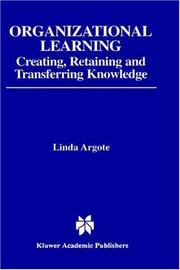| Listing 1 - 8 of 8 |
Sort by
|
Book
ISBN: 1489987150 1461452503 1461452511 128384916X Year: 2013 Publisher: New York : Springer,
Abstract | Keywords | Export | Availability | Bookmark
 Loading...
Loading...Choose an application
- Reference Manager
- EndNote
- RefWorks (Direct export to RefWorks)
Why do some organizations learn at faster rates than others? Why do organizations "forget"? Could productivity gains acquired in one part of an organization be transferred to another? These are among the questions addressed in Organizational Learning: Creating, Retaining and Transferring Knowledge. Since its original publication in 1999, this book has set the standard for research and analysis in the field. This fully updated and expanded edition showcases the most current research and insights, featuring a new chapter that provides a theoretical framework for analyzing organizational learning and presents evidence about how the organizational context affects learning processes and outcomes. Drawing from a wide array of studies across the spectrum of management, economics, sociology, and psychology, Organizational Learning explores the dynamics of learning curves in organizations, with particular emphasis on how individuals and groups generate, share, reinforce, and sometimes forget knowledge. With an increased emphasis on service organizations, including healthcare, Linda Argote demonstrates that organizations vary dramatically in the rates at which they learn—with profound implications for productivity, performance, and managerial and strategic decision making. .
Knowledge management. --- Knowledge transfer. --- Organizational learning. --- Organizational learning --- Knowledge management --- Management --- Commerce --- Business & Economics --- Management Styles & Communication --- Marketing & Sales --- Business planning. --- Business enterprises --- Business plans --- Corporate planning --- Corporate strategy --- Corporations --- Strategy, Corporate --- Learning organizations --- Planning --- Business. --- Leadership. --- Organization. --- Planning. --- Personnel management. --- Business and Management. --- Human Resource Management. --- Business Strategy/Leadership. --- Strategic planning --- Learning --- Communities of practice --- Ability --- Command of troops --- Followership --- Organisation --- Employment management --- Human resource management --- Human resources management --- Manpower utilization --- Personnel administration --- Public administration --- Employees --- Employment practices liability insurance --- Supervision of employees --- Personnel management --- Creation (Literary, artistic, etc.) --- Executive ability --- Organization

ISBN: 0792384202 9780792384205 Year: 1999 Publisher: Boston: Kluwer,
Abstract | Keywords | Export | Availability | Bookmark
 Loading...
Loading...Choose an application
- Reference Manager
- EndNote
- RefWorks (Direct export to RefWorks)
Digital
ISBN: 9781461452515 Year: 2013 Publisher: Boston, MA Springer US
Abstract | Keywords | Export | Availability | Bookmark
 Loading...
Loading...Choose an application
- Reference Manager
- EndNote
- RefWorks (Direct export to RefWorks)
Why do some organizations learn at faster rates than others? Why do organizations "forget"? Could productivity gains acquired in one part of an organization be transferred to another? These are among the questions addressed in Organizational Learning: Creating, Retaining and Transferring Knowledge. Since its original publication in 1999, this book has set the standard for research and analysis in the field. This fully updated and expanded edition showcases the most current research and insights, featuring a new chapter that provides a theoretical framework for analyzing organizational learning and presents evidence about how the organizational context affects learning processes and outcomes. Drawing from a wide array of studies across the spectrum of management, economics, sociology, and psychology, Organizational Learning explores the dynamics of learning curves in organizations, with particular emphasis on how individuals and groups generate, share, reinforce, and sometimes forget knowledge. With an increased emphasis on service organizations, including healthcare, Linda Argote demonstrates that organizations vary dramatically in the rates at which they learn—with profound implications for productivity, performance, and managerial and strategic decision making. .
Methodology of economics --- Economics --- Production management --- Business management --- Business economics --- financieel management --- bedrijfsplanning --- bedrijfseconomie --- bedrijfsorganisatie --- economie

ISBN: 0387225811 Year: 2005 Publisher: New York Springer
Abstract | Keywords | Export | Availability | Bookmark
 Loading...
Loading...Choose an application
- Reference Manager
- EndNote
- RefWorks (Direct export to RefWorks)
Book
ISBN: 0803923686 0803923694 9780803923690 9780803923683 Year: 1984 Volume: 5 Publisher: Beverly Hills (Calif.) : Sage,
Abstract | Keywords | Export | Availability | Bookmark
 Loading...
Loading...Choose an application
- Reference Manager
- EndNote
- RefWorks (Direct export to RefWorks)
Book
ISBN: 9780190263362 0190686200 9780190686208 0190263377 0190686197 9780190263379 9780190686192 Year: 2017 Publisher: New York : Oxford University Press,
Abstract | Keywords | Export | Availability | Bookmark
 Loading...
Loading...Choose an application
- Reference Manager
- EndNote
- RefWorks (Direct export to RefWorks)
Although individual learning has elicited substantial theoretical and empirical attention for well over 100 years, systematic work on how groups and organizations learn from their experience, retain the knowledge they acquire, and transfer this knowledge is much more recent. Moreover, because the literatures on group and organizational learning developed relatively independently, few efforts have been made to analyze their similarities and differences. The goals of this Handbook are to provide comprehensive and up-to-date reviews of both fields by leading scholars, to identify important cross-cutting themes, and to suggest productive avenues for future research.
Organizational learning --- Learning organizations --- Learning --- Communities of practice --- Knowledge management --- E-books --- Organizational learning. --- Apprentissage organisationnel --- Social psychology --- Educational psychology --- Didactic strategies
Digital
Year: 2013 Publisher: Cambridge, Mass. National Bureau of Economic Research
Abstract | Keywords | Export | Availability | Bookmark
 Loading...
Loading...Choose an application
- Reference Manager
- EndNote
- RefWorks (Direct export to RefWorks)
Extending research on organizational learning to multi-product environments is of particular importance given that the vast majority of products are manufactured in such environments. We investigate learning in a multi-product facility drawing on exceptionally rich data for a manufacturing firm that is a leading producer of high technology components. Weekly data for 10 years from the firm's production and human resource tracking systems are augmented by surveys of managers and engineers and by extensive first-hand observation. We find that productivity improves when multiple generations of the firm's primary product family are produced concurrently, reflecting the firm's ability to augment and transfer knowledge from older to newer product generations. No significant transfer of knowledge is evident between the primary product family and other products. Productivity is, however, decreased when the production facility is faced with extensive within-product buyer-specific customizations.We develop the implications of these findings for theory and practice.
Book
Year: 2013 Publisher: Cambridge, Mass. National Bureau of Economic Research
Abstract | Keywords | Export | Availability | Bookmark
 Loading...
Loading...Choose an application
- Reference Manager
- EndNote
- RefWorks (Direct export to RefWorks)
Extending research on organizational learning to multi-product environments is of particular importance given that the vast majority of products are manufactured in such environments. We investigate learning in a multi-product facility drawing on exceptionally rich data for a manufacturing firm that is a leading producer of high technology components. Weekly data for 10 years from the firm's production and human resource tracking systems are augmented by surveys of managers and engineers and by extensive first-hand observation. We find that productivity improves when multiple generations of the firm's primary product family are produced concurrently, reflecting the firm's ability to augment and transfer knowledge from older to newer product generations. No significant transfer of knowledge is evident between the primary product family and other products. Productivity is, however, decreased when the production facility is faced with extensive within-product buyer-specific customizations.We develop the implications of these findings for theory and practice.
| Listing 1 - 8 of 8 |
Sort by
|

 Search
Search Feedback
Feedback About UniCat
About UniCat  Help
Help News
News